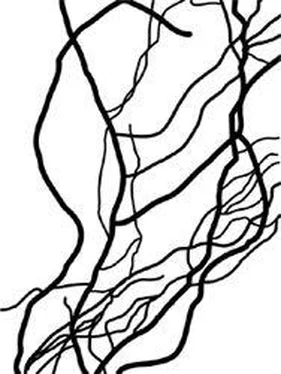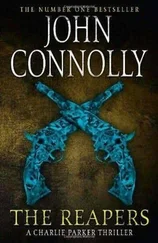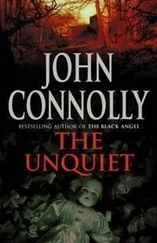Warily, testing the way before he took a step, he made room for the others to join him. Constable Peel was the first up.
“Oh, Lor’,” he said as he took in the view. “I don’t feel at all well.”
For a moment, he appeared to want to turn back and take his chances with the vanishing stairs, but Samuel reassured him.
“It’s okay,” he told Constable Peel. “There’s still a floor under us. You can see it if you look hard enough.”
Constable Peel didn’t want to look. Looking meant seeing infinity, or as good as, waiting right beneath his feet. He stretched out a hand to balance himself, and Angry gripped it.
“It’s all right, Constable,” he said. “I have you.”
“If I fall,” said Constable Peel, “I’m taking you with me. At least I’ll die happy.”
With Angry’s help, Constable Peel came to grips with the concept of a floor that both was and wasn’t there. They repeated the process as the rest of the group joined them, until at last they were all standing together, alternating between fear and awe at the terror and majesty of the Multiverse, and at the one construction that really didn’t seem to belong in it, for standing before them was Santa’s Grotto.
Samuel couldn’t understand why they hadn’t noticed it before. Maybe they’d been too concerned with not falling, and with taking in the view, but it was hard to ignore a little stone house with smoke pouring from its chimney and snow on its roof—real snow, because it had now begun to descend on them as well, tickling their faces before melting on their skin. The light flickering through its walls turned from white to orange as they watched, as though a great fire were raging inside.
The door opened, and Mr. St. John-Cholmondeley appeared.
“Look,” said Jolly, “it’s Mr. Smokey-Chimney.”
“So it is,” said Dozy. “Oi, we want a word with you about this job, Slimy-Chopsticks. We’re starting to think that we might not want it after all; that, or you need to pay us more.”
Now it was Mr. St. John-Cholmondeley’s turn to glow red.
“It’s Sinjin-Chumley!” he screamed. “How many times do I have to tell you? Sinjin-Chumley! It’s just two words. How hard can it be?”
Even amid the chaos of the Multiverse, the dwarfs could see that he was annoyed. The dwarfs prided themselves on their sensitivity to the feelings of others.
“Sorry,” said Angry.
“Yes, sorry,” said Jolly and Dozy.
“Applidlespopop,” said Mumbles.
“He says he’s sorry, too,” said Angry.
“Sorry, Mr. . . . ?” said Mr. St. John-Cholmondeley.
He cocked his head, and waited for a reply.
The dwarfs looked at one another. Somebody had to give it a try. Angry, who had decided that he’d had enough of taking the lead for one day, gave Jolly a nudge.
“Sorry,” said Jolly, “Mr. Slimjim . . .”
He ran out of steam. Dozy gave it a try.
“Sorry, Mr. Soapy-Chandling.”
“Mr. Slightly-Chafing.”
“Mr. Singing-Chutney.”
“Mr. Stinky-Cheesecake.”
There is a phrase sometimes used about people who are very angry: “he was incandescent with rage.” An incandescent light, as I’m sure you know, is one with a filament that glows white hot when heated. It does not, of course, mean that someone really glows white hot when annoyed, or it didn’t until Mr. St. John-Cholmondeley came along. As they watched, Mr. St. John-Cholmondeley’s eyes turned bright red, and then changed from red to burning white before bursting into flames. He opened his mouth, and smoke and fire jetted from between his lips. His whole body shook as smoke poured from his sleeves, and the ends of his trousers, and the neck of his shirt.
“It’s—” he roared, but he got no further. His suit ignited and his body exploded, but there was no blood or flesh, only bits of plastic. Mr. St. John-Cholmondeley was simply a showroom dummy in a cheap suit brought to life, and now that existence was at an end. His head, which had soared high into the air with the force of the blast, landed with a thud and rolled across the nearly unseen floor, where Angry stopped it with his foot.
The white light was fading from Mr. St. John-Cholmondeley’s eyes, and his skin was assuming the hardness of plastic. The dark force that had animated him was leaving, but there was a little wretched life left in him yet.
“It’s—” he began again, but Mumbles interrupted him.
“Sinjin-Chumley,” Mumbles said, pronouncing it perfectly.
“We knew all along,” said Angry. “Serves you right for being unpleasant.”
Mr. St. John-Cholmondeley found the strength to make his eyes glow an angry orange one last time before the light vanished from them and all that remained was a plastic head. Two thin streams of pure darkness poured from his ears and flowed beneath the walls of Santa’s Grotto, and that darkness seemed to be mirrored above their heads. More stars were snuffed out, swallowed by swirling clouds like thick black ink. Eyeless faces appeared in the void, but their very blindness made them more threatening. Long grasping fingers stretched out toward the Earth, and black tongues licked at lipless mouths, as though already tasting the planet’s light and life before consuming it. But the barrier between the Shadows and the universe held, for now. The Shadows flattened themselves against it, but they could not penetrate. It would not hold for much longer, though. Already cracks were visible, shining red like streams of lava.
Nurd appeared at Samuel’s right hand.
“All of this because of us,” said Nurd, and he sounded both amazed and terribly, terribly sad. “She will sacrifice whole universes to the Shadows in order to avenge herself.”
“What if we just offered ourselves to her?” said Samuel softly, and if Nurd had been astonished by the lengths to which Mrs. Abernathy was prepared to go to have her revenge, he was more astonished still at the boy’s words, and he felt honored that he could call such a person his friend. Billions of years in age separated them. One was human, the other demon. Yet in all his long life, Nurd had never felt closer to another being than he did to Samuel. The Multiverse had brought them together, and they had both been changed utterly by the meeting. Samuel had crossed dimensions, and now understood something of the true nature of existence. He had confronted the greatest of evils, but he had also been saved by a demon.
And that demon had himself been saved by Samuel: had they not met, then Nurd would still have been living in exile in the bleakest, dullest part of Hell with only Wormwood for company, devising plots that would never come to pass. Nurd would just have been another failed demon, an entity not weak enough to be truly evil, but not strong enough to be good either.
Now this boy was suggesting that they try to lay down their lives not just for their friends but for humanity and for every other life-form, known and unknown, that swam or flew or crawled in the Multiverse. As Nurd watched, Boswell, who had been standing just behind Samuel and peering through his master’s legs at all that was happening, shifted position, and moved to Samuel’s side, where he sat down with his weight leaning against the boy’s right leg.
He hears Samuel, thought Nurd, who had long ago learned not to underestimate the little dog. He senses what the boy is thinking of doing, and he will not leave him. This dog will die with its master rather than abandon him. If a small dog is willing to stand beside the boy at the cost of its life, then what choice have I but to do the same?
“We can try,” said Nurd, “but I fear that Mrs. Abernathy is so insane by now that it won’t be enough for her to see only us suffer, and she has made her bargain with the Shadows. They will not let her break it easily. Perhaps, though, we can appeal to her vanity. Even the cruelest of beings must sometimes show mercy. If there is a power in taking lives, there is a greater power in sparing them. If we can make her believe that letting humanity survive would better demonstrate her might than allowing the Shadows to consume everything, then we could have a chance.”
Читать дальше












